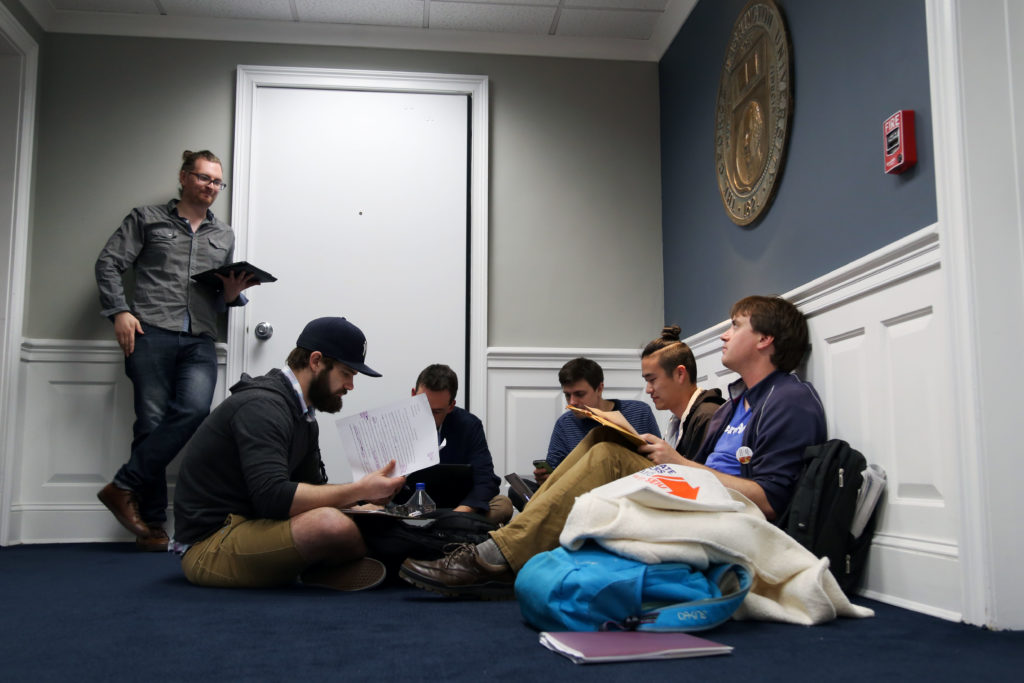Updated: Sept. 25, 2018 at 9 p.m.
Graduate students are halting their push to unionize.
Leaders of Graduate Students United, a student group advocating for graduate students’ rights to collectively bargain, said the organization is putting a pin in its unionization efforts after officials repeatedly refused to recognize them as student workers last spring. The group can’t challenge the University’s stance at a national labor board without risking overturning all graduate student unions’ rights to organize, they said.
Instead, the group is shifting its focus to issue-based advocacy and will lobby officials to lower the cost of graduate students’ health care plans, members said.
“Just because they don’t formally recognize us and we’re not instituted into the daily goings-on of the University, we’re confident that we can make our needs known,” Jackie Bolduan, a third-year graduate student and leader of the unionization efforts, said.
Graduate students initially launched a campaign to unionize last September, citing concerns about low wages and high health care costs. But Provost Forrest Maltzman released a statement in March saying that officials would only recognize graduate students’ relationship with the University as educational, not professional.
Graduate students continued the push for unionization by sending letters to officials and staging sit-ins in Rice Hall throughout the spring semester. Maltzman eventually agreed to meet with graduate students in late April after the first sit-in, but he reiterated his initial stance against unionization during the meeting.
Bolduan said officials have repeated their opposition to unionization all year, making it difficult to continue pressing the University. Graduate students could bring their case to the National Labor Relations Board, but the board has historically been resistant to student unions under Republican administrations.
She said the group still aims to convince officials to recognize graduate students as employees, but the effort is at a standstill while the organization recruits more members. In the meantime, the group is focusing on educating students about GW’s health care and voicing concerns to administrators about the cost of plans.
Graduate students currently pay about $4,000 a year for health care, but they said that Aetna, GW’s provider, doesn’t cover dental work or vision care and hikes costs for emergency hospital visits outside D.C. Several of GW’s peer schools, including New York and Boston universities, either offer free health care or plans that hover around $2,000.
Bolduan said members of the group will visit graduate students at different academic departments and talk with teaching and research assistants about their daily struggles, like paying for rent and transportation on a relatively low wage, over the course of the semester. Members will then ask officials for meetings to “let them hear our issues,” she said.
She added that the group will work with the Progressive Student Union and host events focused on health care, but she declined to say what the collaboration and events would entail.
“We’re just doing tried-and-true organizing at this point,” she said. “We’re emailing folks, we’re getting to know people, getting coffee with people and connecting with folks because there’s no one on campus who has nothing to say or has no feelings about their position.”
Bolduan said that after Graduate Students United petitioned officials for free health care for graduate workers last academic year, the University began to allow some graduate workers to pay for the health insurance plan in installments – a move she said was a direct result of their demands. Students typically have to pay upfront for their health care.
At least 100 graduate students are currently involved with Graduate Students United, but there are several hundred more supporters on campus in both the graduate and undergraduate student populations, Bolduan said.
“We want to continue to ride the wave of that win, and that is proof that the union works and that there is power in numbers,” she said.
Members of Graduate Students United said that while unionization efforts have paused, they anticipate that the group can still garner more graduate student support this semester, but they aren’t sure when the push to unionize can officially begin again.
Julie Chamberlain, a seventh-year doctoral student, said the group hopes to build off the recent success of graduate student unions at other D.C. schools, like Georgetown and American universities. Officials at both schools agreed in the spring to allow graduate students to vote on forming a union without going through the NLRB.
American University voted to unionize, while Georgetown students still await an election.
Chamberlain said that when Graduate Students United presses officials for formal recognition again in the future, the group can hold the other unions up as a model for GW graduate students’ collective bargaining group.
“It’s encouraging to us that this is happening at other universities because we hope that the GW administration will look around and want to be on the right side of that,” she said.
But Matt Payne, a second-year doctoral student, said he anticipates the University will formally recognize the union by the end of this academic year because the support from graduate students is “only increasing.”
“If you want to basically prove to the University that this is a legitimate thing, which it is, a way in which to do that is just to show how many graduate students want this to happen,” he said.
This post was updated to reflect the following correction:
The Hatchet incorrectly reported that Georgetown University graduate students had voted to unionize. They are still awaiting an election. We regret this error.




